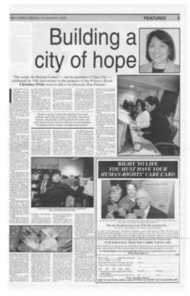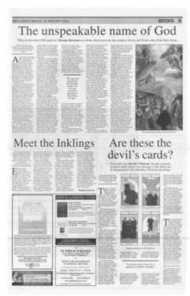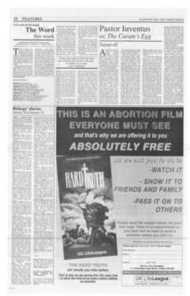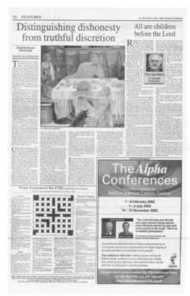Page 7, 18th January 2002
Page 7
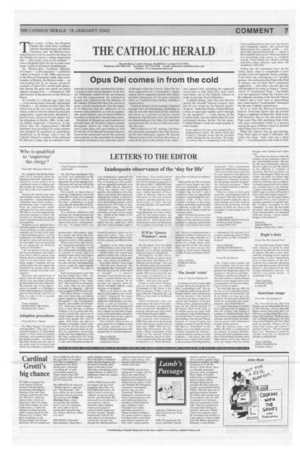
Report an error
Noticed an error on this page?If you've noticed an error in this article please click here to report it.
Tags
Share
Related articles
Hips, Wealth And Women
The'ordinary Catholics Of 134)u •
Opus Dei And The Authentic Spirit Of Vatican Ii
Saint-to-be Pro Hitler, Priest Says
Escriva Fills St Peter's
Opus Dei Comes In From The Cold – But Its Critics Are...
THE CATHOLIC HERALD
Opus Dei comes in from the cold
Two events within the English Church this week have combined with the announcement, just before Christmas, that the Blessed Josemaria Escriva is to be raised to the altars of the Chinch, to convey a strong impression that — after many years on the margins even in England Opus Dei has in some sense made a kind of definitive breakthrough.
On Wednesday, Cardinal Murphy O'Connor — a firm supporter — celebrated a Mass in honour of the 100th anniversary of the Blessed Josemaria's birth. And across London, in Brixton, the Baytree centre — an outstanding but by no means untypical example of Opus Dei's world-wide apostolate among the poor (an article on which appears on page five) — celebrated its 10th anniversary in the presence of the Princess Royal.
As recently as a decade ago, there was — even among many normally fairminded Catholics — an attitude towards Opus Dei which was at the very least suspicious and which could at worst be almost hysterically antagonistic. Lurid anecdotes abounded; a kind of locus classicus of such stories was the allegation in March, 1986, in the radical Italian magazine, L'Espresso, to the effect that the organisation's 80,000 members were governed by secret statutes that pledged its members to unthinking obedience in all things; that it was the Catholic Church's version of the outlawed P2 Masonic Lodge; that its members were required to keep their membership hidden. A group of anti-clerical deputies in the Italian Parliament called for the government to ban the organisation. An exhaustive inquiry was carried out by the Ministry of the Interior. It found that Opus Dei was in no sense a secret organisation; that the names of its directors and the addresses of its centres were published, as were its supposedly secret statutes, one of which forbad its members to keep their membership secret.
Hundreds of allegations and hundreds of rebuttals later, the hysteria is almost entirely dissipated. Above all, what has become clear is that those who give thanks to God for the life of the Blessed Josemaria Escriva (soon to be canonised) and for the colossal achievements of the apostolate he founded cannot be confined to any particular school of thought within the Church. Opus Dei has been supposed to be a "reactionary" organisation; but its supporters include such distinguished luminaries of the post-conciliar years as Cardinal Franz Konig, nobody's conservative.
Cardinal Konig's recent remarks (reported on page four) are illuminating, illustrating as they do not only that much of the criticism has been to a greater or lesser extent misplaced, but that most of it was based on an understanding of the Opus Dei mind that was precisely the reverse of what was actually the case.
Most ludicrous of all, perhaps, has been the universal assumption that Mgr Escriva set his face obdurately against the Second Vatican Council (this has been the source of some of the most richly absurd of the calum nies against him, including his supposed secret plan to take Opus Dei, lock, stock and barrel, out of the Catholic Church in order to join the Greek Orthodox).
Cardinal Konig, who first met Escriva during the Second Vatican Council, says that he was struck by the Spanish priest's desire to "make the Church, without Roman collars or episcopal regalia, active through its lay members" — a key theme of the Council itself, and one which Opus Dei had anticipated decades before. On this point, Cardinal Konig's words are worth quoting at some length:
In my opinion, he was a man energised by a magnanimous spirit. He asked about the Council; I became aware that he travelled widely fanning the lay apostolate. We spoke a lot about what was happening in the world; I soon realised that in him I saw the Church alive (emphasis added)....He realised that there existed two separate worlds — religious life and professional life — which in fact should be harmonised. What then Escriva was preaching came across as complete novelty. Even though the Church teaching authority today espouses such ideas, the reception is still slow.
Today, the old calumnies have all but fallen silent; what is remarkable is how quickly it has all happened. Partly, perhaps, it has been one consequence of a parallel process: the realisation that Pope John Paul II (always one of Opus Dei's staunchest supporters) — who only a decade ago was still thought of by many as being a "conservative" or "reactionary" Pope — has finally won the argument within the Church over the authentic meaning of the Second Vatican Council, and is now seen as representing not a some kind of "restorationist" aberration but the true Catholic mainstream.
So it is with the Blessed Josemaria Escriva. Everyone knows that the present Pope is a supporter of Opus Dei. What is less well known is that so, too, has been every Pope since Pius XII, including Pope John, who gave substantial funds to a project among the poor of Rome which he himself asked Opus Dei to carry out.
When the scheme was up and running, Pope Paul came to open it officially. His verict was clear: "tutto, tutto qui e Opus Dei" — everything here is the work of God.
blog comments powered by Disqus






